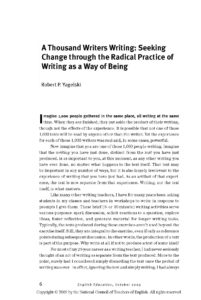Author: Robert Yagelski
Summary: Have you ever found yourself having to justify teachers’ writing as a key, non-negotiable component of your site’s professional development? If so, this article can help ground you in the importance and value of the act of writing. Yagelski proposes a pedagogy of “writing as a way of being” and describes how the approach can encourage awareness, reflection, and inquiry in ways that product-focused approaches may not. Yagelski’s full vision–that writing is more than communication, and that our lives and thinking live within writing–will be helpful to any teacher inquiry group or educator/leader teams who are working together to construct their own philosophical stance about writing: what it is, what it does, and what it should look like in classrooms. This piece will also be an invaluable resource for any teachers needing to justify the practice of having students write without being directly tied to the day’s objective, goal, or standard.
Original Date of Publication: July 23, 2010
Excerpt
For most of my 25-year career as a writing teacher, I had never seriously thought of an act of writing as separate from the text produced. More to the point, rarely had I considered simply discarding the text once the period of writing was over—in effect, ignoring the text and simply writing. I had always assumed, like most English teachers I know, that writing should produce a text to be used for some explicit purpose—to keep a record, promote learning, communicate ideas or information, or demonstrate writing ability (as in the context of assessment).
It was not until I attended the opening session of the National Writing Project’s annual conference in 2004 that I began to consider the experience of an act of writing as separate from—and as valuable as—the text produced as a result of that act of writing.
Some 1,000 educators from around the United States gathered in a hotel ballroom in Indianapolis, and they were writing for its own sake. As the new director of a National Writing Project site in Albany, New York, I quickly learned that almost all NWP events, whether local or national, large or small, begin with writing. And almost never is the purpose of that writing to produce a text to be read or used by someone other than the writer. We write—together—for other reasons, because writing as an activity matters, separate from any text that is produced.
In that Indianapolis ballroom, writing was in fact an act of being, an intense awareness of ourselves in that moment: 1,000 individuals writing, together, in a moment in time and space. In this sense, writing is a potentially powerful vehicle for transformation, for it opens up possibilities for awareness, reflection, and inquiry that writing as an act of textual production does not necessarily do. Writing in the moment, I have come to realize, has the capacity to change us.
Related Resources
- Hey Matt! There’s a Reason We Write Like Every Day!
- Beyond Strategies: Teacher Practice, Writing Process, and the Influence of Inquiry
- Conversation Currents: Writing: A Mode of Thinking
- Why I Write: Scientist Timothy Ferris on Writing to Learn
Original Source: National Writing Project, http://www.nwp.org/cs/public/print/resource/3220
